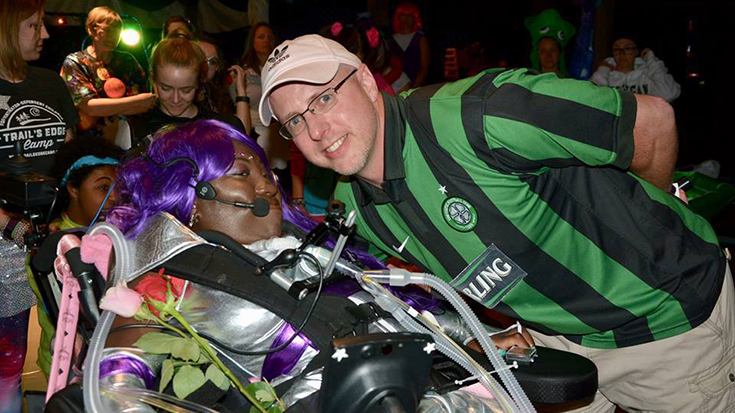
Trail’s Edge Camp (TEC) provides a summer camp experience for ventilator-dependent children. Located at the Fowler Center for Outdoor Learning in Mayville, MI, the seven-day camp takes place every year in June and is available at no cost to the families of the children who attend. TEC offers a unique outlet for RTs to strengthen their focus on the patient.
AARC member Jeff Cain, RRT, has been involved with the camp for more than 20 years and now serves as its director.
His role in the camp is a big part of the reason why he was named a runner up for the 2017 AARC/FACES Foundation National Respiratory Patient Advocacy Award.
Week-long respite
“My professional focus has been in critical care medicine, however my involvement in TEC has helped to broaden my perspective when it comes to patient care,” said Cain, who currently serves as the pediatric ICU respiratory care clinical supervisor at C.S. Mott Children’s Hospital/Michigan Medicine in Ann Arbor.
While he knows his main job is to focus on the needs of his patients, seeing them outside of the hospital has taught him that when it comes to critically ill children, the entire family unit is affected.
“Even after discharge from the hospital, the needs of the family of children dependent on medical technology are tremendous,” Cain said.
Trail’s Edge offers families a respite from the trials of taking care of a ventilator-dependent child. The children simply love the experiences the camp gives them, such as climbing in the Craig Van Laanen Tree House, which was built by Trail’s Edge volunteers and volunteers from the University of Michigan School of Engineering.
No insignificant gestures
Cain believes RTs have the right background and skills to help ventilator-dependent children and their families have a better quality of life.
“Even something as simple as a summer camp can have a life-changing effect on the lives of the children and families involved,” Cain said.
Cain says advocating for patients through activities, such as summer camps, is great, but there is more RTs can do at the bedside as well.
“Whether it’s helping to guide the correct course of therapy, providing education, or something as simple as offering compassion or a sympathetic ear to our patients and families, the opportunities are there, and there is no such thing as an insignificant gesture,” Cain said.
He knows many RTs already do that every day on the job.
“I have yet to meet an RT who has gone into the profession because it’s a glamorous one,” Cain said. “It may sound cliché, but most of us became RTs simply to help our patients to breathe easier.”
Learn More About the National Respiratory Patient Advocacy Award